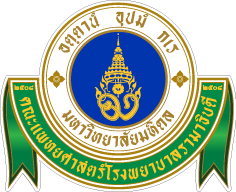Ethical Dilemma – Primary care consultation during Covid-19 Pandemic
As Thailand experiences the 3rd wave of covid-19 infection and with a record number of daily infections and fatality rate, our primary health care system faces a new challenge having to take care of covid-19 patients who are fit enough to undertake home quarantine along with managing patients with chronic health diseases as an outpatient basis.
During the past 12 months, there has been a sharp rise in the need for telemedicine consultation for patients with chronic health diseases as government advises limitation to travel to help curb the covid-19 infection rate.
At the same time, a good proportion of patients who visit their family doctors at Ramathibodi Hospital are elderly over the age of 60 and have more than one health condition that would ideally require regular health monitoring through clinical evaluation along with laboratory/ radiological investigation.
Family doctors have an ethical dilemma deciding whether their patients particularly the vulnerable should remain at home and conduct telemedicine consultation relying on basic history gathering without the ability to conduct physical examination or monitor laboratory investigations, renewal of old prescriptions, and arranging a follow-up visit once the pandemic is better to control which could be in a few months or many months’ time or if the patient feels at ease leaving home to travel and visit their family doctor.
Should patients decide to visit the hospital for their routine follow-up? Family doctors need to take into consideration of patient immunization history, traveling distance especially patients traveling to Bangkok which is considered a high-risk area for Covid-19 infection from provinces that are safe from covid-19, other matters such as mode of transport (bus, train, or private vehicle) also needs to be accounted for.
Primary care consultation takes into account not only patient physical complaints, but it needs to address psychological issues, social factors, and spiritual aspects. However, in the covid-19 pandemic, there has been a shift in consultation techniques amongst many care providers where one would need to take into consideration the duration of consults and maintaining a safe distance minimizing the risk of unforeseen transmission. Doctors no longer see patient’s facial expressions and patients no longer recognized their doctor’s face as both parties are required to wear masks at all times, where some would also wear a face shield.
In the past, if a patient cry, we would be able to support them offering a tissue to wipe off their tears or lean forward and offer comfort either by touching their hands or shoulders and give them support, an act of compassion, such acts are not possible now due to infection control protocols.
Since the beginning of June, vaccination rolled out have begun prioritizing patients with 7 chronic health diseases (heart disease, respiratory disease, chronic renal impairment, type II diabetes mellitus, chronic liver disease, neurological conditions, and morbid obesity) and patients over aged 60[1]. In reality, many elderlies could not register for their vaccines as the registration process requires a level of IT literacy skills and many do not even have access to smartphone devices.[2] As a result, many patients unable to register and concerns about vaccination safety would take the risk of visiting their family doctor to have a discussion about vaccination registration and safety.
In reality, family doctors are front-line workers for disease prevention and health promotions. The new normal family medicine practice including challenging issues from telemedicine consultation to vaccination recommendation continues to be a learning factor and allows us to strive and develop a better health care system for all.
The ethical issue to consider:
Providing care at the time of pandemic:
Covid-19 pandemic had raised many questions on the morality of medical care from prioritization of vaccination to get basic health care consultation. Whilst health care workers continue to learn and adapt to the fast pace changes from policies to treatment guidelines, we could use the four principles approach by Beauchamp and Childress.[1]
Respect for autonomy as our patients have a right to accessing healthcare in particular for the management of their chronic disease, if a patient presents to the hospital seeking healthcare, we are duty-bound to provide the best possible healthcare regardless of their vaccination status.
Non-maleficence accounts for the obligation to avoid causing harm. Screening questionnaires about recent infection with covid-19, immunization status, and health workers’ daily self-assessment checklist are done to ensure safety for our patients and also prevent us from getting or spreading the infection to our colleagues and our patients.
Beneficence is an obligation to provide benefits and to balance benefits against the risk. The concept of telemedicine practice is a noble example of providing basic health needs for our patients in their own homes. This way our patients could avoid unnecessary travel until they have been fully immunized.
Justice is fairness in the distribution of resources. The pandemic had raised a lot of questions on the issue of justice in our healthcare system from who gets vaccines and types of vaccines given depending on many factors.
Let’s continue to think, challenge, and share our experience during the covid-19 pandemic.
Written by Dr Veerachai Sachdev
Updated on 14th August 2021
[1] Bangpara M. 16th June 2021. Jab allocation was a “mess” from start. Bangkok post.
[2] Boonlert T. 9th June 2021. State of confusion. Bangkokpost.
[3] Beauchamp TL, Childress J. Principles of biomedical ethics. New York: Oxford University Press, 1st ed, 1979; 5th ed, 2001.
Rewrite by
Graphics by Maneenuch kasemtima
